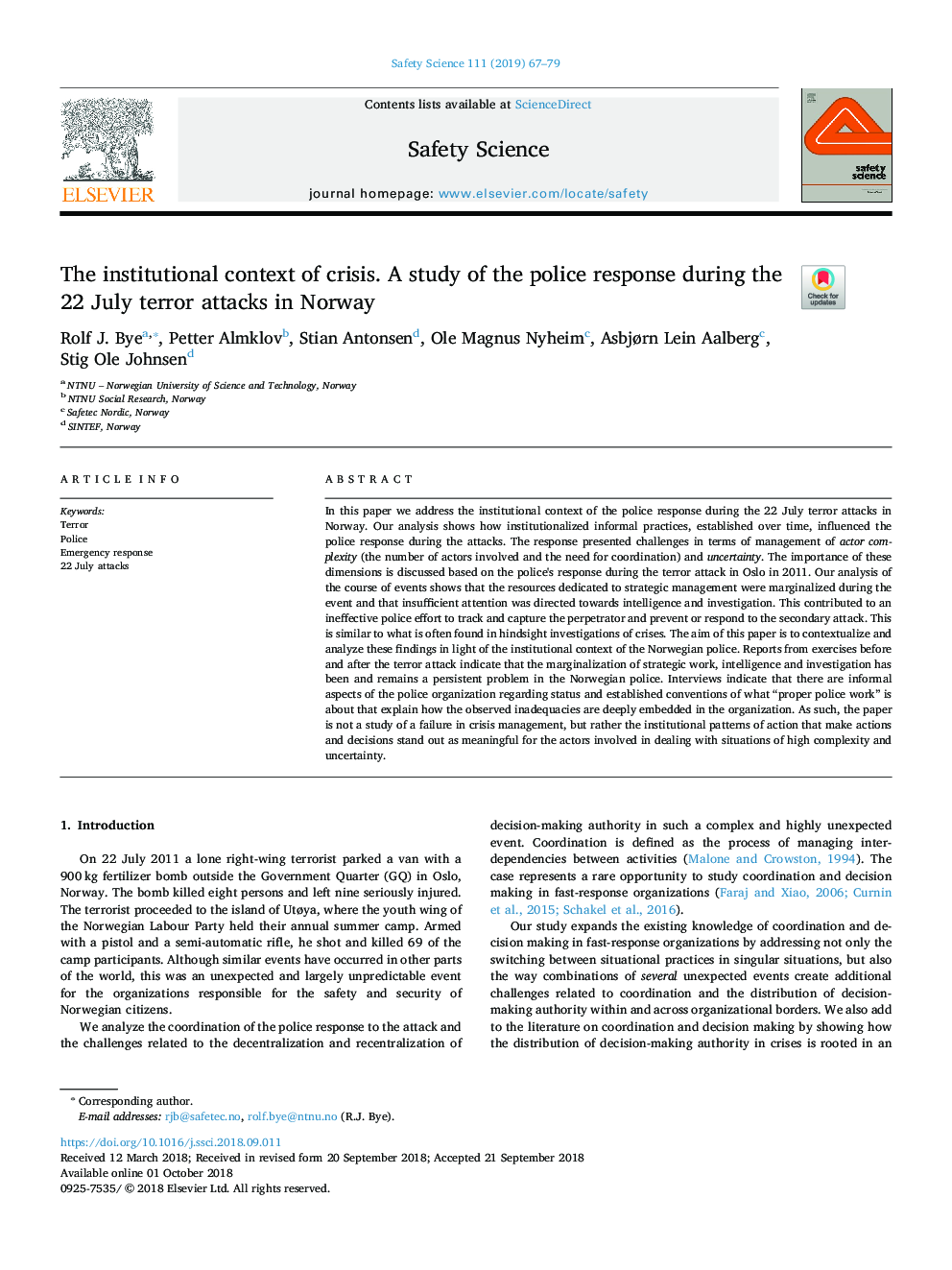| کد مقاله | کد نشریه | سال انتشار | مقاله انگلیسی | نسخه تمام متن |
|---|---|---|---|---|
| 11023850 | 1701244 | 2019 | 13 صفحه PDF | دانلود رایگان |
عنوان انگلیسی مقاله ISI
The institutional context of crisis. A study of the police response during the 22 July terror attacks in Norway
ترجمه فارسی عنوان
زمینه سازمانی بحران. مطالعهی پاسخ پلیس در طول حملات تروریستی 22 جولای در نروژ
دانلود مقاله + سفارش ترجمه
دانلود مقاله ISI انگلیسی
رایگان برای ایرانیان
کلمات کلیدی
ترور، پلیس، پاسخ اضطرار ی، حملات ماه ژوئیه،
ترجمه چکیده
در این مقاله، ما در مورد مسائل نهادی پاسخ پلیس در طول حملات تروریستی 22 جولای در نروژ می پردازیم. تجزیه و تحلیل ما نشان می دهد که شیوه های غیر رسمی که در طول زمان ایجاد شده اند، چگونه بر واکنش پلیس در طی حملات تأثیر می گذارد. پاسخ این چالش ها را از نظر مدیریت پیچیدگی بازی (تعداد بازیگران و نیاز به هماهنگی) و عدم اطمینان ارائه کرد. اهمیت این ابعاد بر اساس پاسخ پلیس در طی حملات تروریستی در اسلو در سال 2011 مورد بحث قرار گرفته است. تجزیه و تحلیل ما در مورد حوادث نشان می دهد که منابع اختصاص یافته به مدیریت استراتژیک در حین این رویداد حاشیه برداری شده اند و توجه کافی به اطلاعات و اطلاعات تحقیق و بررسی. این کمک به تلاش پلیس بی اثر برای ردیابی و تسخیر عاملان و جلوگیری از حمله ثانویه یا پاسخ دادن به آن است. این همان چیزی است که اغلب در تحقیقات پیشین بحران ها یافت می شود. هدف این مقاله این است که این یافته ها را با توجه به چارچوب نهادی پلیس نروژی متمرکز سازد و تحلیل کند. گزارش از تمرینات قبل و بعد از حمله تروریستی نشان می دهد که حاشیه سازی کار استراتژیک، اطلاعات و تحقیقات در یک پلیس نروژی یک مشکل مداوم بوده است. مصاحبه ها نشان می دهد که جنبه های غیر رسمی سازمان پلیس در رابطه با وضعیت و توافق نامه هایی وجود دارد که پلیس کار درستی دارد؟ در مورد این است که توضیح می دهد که ناتوانی های مشاهده شده عمیقا در سازمان تعبیه شده اند. به همین ترتیب، این مقاله مطالعه شکست در مدیریت بحران نیست، بلکه این است که الگوهای سازمانی اقداماتی که اقدامات و تصمیمات را به عنوان معنی دار برای بازیگران درگیر در موقعیت های پیچیده و عدم اطمینان در نظر می گیرند.
موضوعات مرتبط
مهندسی و علوم پایه
مهندسی شیمی
بهداشت و امنیت شیمی
چکیده انگلیسی
In this paper we address the institutional context of the police response during the 22 July terror attacks in Norway. Our analysis shows how institutionalized informal practices, established over time, influenced the police response during the attacks. The response presented challenges in terms of management of actor complexity (the number of actors involved and the need for coordination) and uncertainty. The importance of these dimensions is discussed based on the police's response during the terror attack in Oslo in 2011. Our analysis of the course of events shows that the resources dedicated to strategic management were marginalized during the event and that insufficient attention was directed towards intelligence and investigation. This contributed to an ineffective police effort to track and capture the perpetrator and prevent or respond to the secondary attack. This is similar to what is often found in hindsight investigations of crises. The aim of this paper is to contextualize and analyze these findings in light of the institutional context of the Norwegian police. Reports from exercises before and after the terror attack indicate that the marginalization of strategic work, intelligence and investigation has been and remains a persistent problem in the Norwegian police. Interviews indicate that there are informal aspects of the police organization regarding status and established conventions of what “proper police work” is about that explain how the observed inadequacies are deeply embedded in the organization. As such, the paper is not a study of a failure in crisis management, but rather the institutional patterns of action that make actions and decisions stand out as meaningful for the actors involved in dealing with situations of high complexity and uncertainty.
ناشر
Database: Elsevier - ScienceDirect (ساینس دایرکت)
Journal: Safety Science - Volume 111, January 2019, Pages 67-79
Journal: Safety Science - Volume 111, January 2019, Pages 67-79
نویسندگان
Rolf J. Bye, Petter Almklov, Stian Antonsen, Ole Magnus Nyheim, Asbjørn Lein Aalberg, Stig Ole Johnsen,
